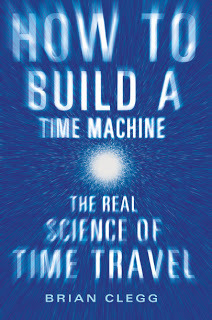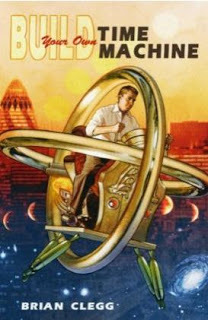Brian Clegg's Blog, page 156
October 31, 2011
Is this a Christmas song record?
 I had the misfortune to have to listen to a bit of Radio 1 at the weekend (it's not my fault, the children made me) and suffered the new Justin Bieber record.
I had the misfortune to have to listen to a bit of Radio 1 at the weekend (it's not my fault, the children made me) and suffered the new Justin Bieber record.I'm sorry to go all grumpy old man, but it's OCTOBER for goodness sake, and he's released a Christmas record.
And what a Christmas record.
It's as if the writers said 'How many Christmas clichés can we cram into one song?' To save you the pain of listening to it, here are the ones I spotted:
Beautiful time of year[Christmas] cheerUnder the mistletoethe winter snowChestnuts roasting [on a fire]Santa's coming tonightReindeers flying in the skyMaking a listWise men followed the starVery merry ChristmasSomewhat bizarrely in the chorus he seems to be enjoying being with his 'shoddy'. Rumour has it that what he was intending to sing was the southern US slang 'shawty' for girlfriend, but I'm convinced he's singing 'shoddy' - which pretty well describes this song.
Published on October 31, 2011 09:45
October 28, 2011
Nostalgia cash
 A Barclaycash slip - lug holes either end of blue stripOn a university tour with one of my daughters the other day, after an hour of trying (and often failing) to make out what a 'student ambassador' with an impossibly thick accent was saying, I stopped at a cash machine and was overcome by a sudden wave of nostalgia.
A Barclaycash slip - lug holes either end of blue stripOn a university tour with one of my daughters the other day, after an hour of trying (and often failing) to make out what a 'student ambassador' with an impossibly thick accent was saying, I stopped at a cash machine and was overcome by a sudden wave of nostalgia. The thing is, I first used a cash machine when I was at university. But, children, we are not talking cash machines as you know them today. There was no plastic card involved. This was Barclaycash, a cross between an ATM and a chequebook.
 You put the slip in drawer 1, entered
You put the slip in drawer 1, enteredyour pin and opened drawer 2
Customers were issued with a book of little slips and a PIN. The slips were for fixed amounts of money and had to be located on little lugs before the machine ate them and spat out the cash. Or, rather, you opened a drawer and there was cash waiting. (I had forgotten until seeing the example above that you signed the slip, just like a cheque.)
Ah, how jealous friends who were with different banks marvelled at the advanced technology. We were practically living the 21st century life. Any day soon we'd have jet packs...
Published on October 28, 2011 00:03
October 27, 2011
Enter the wonder drug
 It's Royal Society of Chemistry podcast time again.
It's Royal Society of Chemistry podcast time again.We take painkillers like paracetamol for granted these days, but when aspirin emerged on the scene, it was a dramatic breakthrough. Its cousin might have been easing pain as powdered willow bark for millennia, but this was something special - so special, in fact, that it featured in a treaty that ended a world war. Have a listen to the rise, fall and rise again story of aspirin.
Published on October 27, 2011 02:07
October 24, 2011
A dalek in Asda
[image error]
A dalek (probably not in Asda)Yesterday there was an dalek in our local Asda. Apart from offering the opportunity for a quick tweet ('Just seen a dalek at Asda. I always thought they shopped at Lidl.') it inspired me to think about what has happened to fear in children.
If, at the age of 8, when I first encountered daleks on TV, I had met one rolling down the frozen food aisle, I would probably have wet myself. In practice this couldn't have happened. First we didn't have a fridge when I was 8, and second there were no supermarkets in Rochdale yet. We still did our food shopping at the Home and Colonial. But I digress. I am a member of the generation that genuinely hid behind the sofa to watch something like Doctor Who.
We peered in terrified delight over the top of the couch at the rather murky images of that first Doctor Who adventure, ready to duck down if necessary. Daleks were seriously scary. In 2011, as far as I can gather, nothing much phases an eight-year-old. Given there hasn't been a huge amount of evolution in my lifetime (I'm not that old), what has happened? Is it that they're all exposed to Saw and other such DVDs from the age of two? I really don't know. But I didn't see one child clutching at their parents, showing fear when the dalek came down the aisle. Bring back the good old days, I say...
Image from Wikipedia
If, at the age of 8, when I first encountered daleks on TV, I had met one rolling down the frozen food aisle, I would probably have wet myself. In practice this couldn't have happened. First we didn't have a fridge when I was 8, and second there were no supermarkets in Rochdale yet. We still did our food shopping at the Home and Colonial. But I digress. I am a member of the generation that genuinely hid behind the sofa to watch something like Doctor Who.
We peered in terrified delight over the top of the couch at the rather murky images of that first Doctor Who adventure, ready to duck down if necessary. Daleks were seriously scary. In 2011, as far as I can gather, nothing much phases an eight-year-old. Given there hasn't been a huge amount of evolution in my lifetime (I'm not that old), what has happened? Is it that they're all exposed to Saw and other such DVDs from the age of two? I really don't know. But I didn't see one child clutching at their parents, showing fear when the dalek came down the aisle. Bring back the good old days, I say...
Image from Wikipedia
Published on October 24, 2011 02:21
October 23, 2011
Potatoes and dogs
[image error]
Probably not very tastyN.B. Before reading this, please be assured I do not condone eating dogs. It shouldn't be done. I love dogs. We are in hypothetical world here.
I was on one of my rare excursions to the pub the other day and the conversation turned, as it does, to potatoes (we'd just been served up with a bowl of chips). One of our number who should have known better (he has a chemistry degree) said something to the effect of 'I've always wondered how potatoes can be so varied in the way they cook. You know, some are great for mash, others for roasting or whatever.'
We raised our collective eyebrows and pointed out that given selective breeding had produced such a range in dogs (for instance), it was hardly surprising that you could get different kinds of potatoes that cook differently.
'Ah, yes,' he pointed out. 'Dogs look very different. But they probably all taste the same.'
Now here's the thing. In a purely hypothetical, scientific fashion, I can't help but wonder if he was right. Is a chihuahua like chicken, but a great dane more like beef? Or do all dogs taste the same? I really don't want anyone to find out, but it does make you wonder.
We then went on to discuss Greek gods. Specifically, did the ancient Greeks believe in their gods as actual entities, or did they consider them merely to be instructive myths?
You see, that's the sort of thing you get down the pub. Downright educational. It's not all football.
I was on one of my rare excursions to the pub the other day and the conversation turned, as it does, to potatoes (we'd just been served up with a bowl of chips). One of our number who should have known better (he has a chemistry degree) said something to the effect of 'I've always wondered how potatoes can be so varied in the way they cook. You know, some are great for mash, others for roasting or whatever.'
We raised our collective eyebrows and pointed out that given selective breeding had produced such a range in dogs (for instance), it was hardly surprising that you could get different kinds of potatoes that cook differently.
'Ah, yes,' he pointed out. 'Dogs look very different. But they probably all taste the same.'
Now here's the thing. In a purely hypothetical, scientific fashion, I can't help but wonder if he was right. Is a chihuahua like chicken, but a great dane more like beef? Or do all dogs taste the same? I really don't want anyone to find out, but it does make you wonder.
We then went on to discuss Greek gods. Specifically, did the ancient Greeks believe in their gods as actual entities, or did they consider them merely to be instructive myths?
You see, that's the sort of thing you get down the pub. Downright educational. It's not all football.
Published on October 23, 2011 04:27
October 21, 2011
The missing translations
 Between 1999 and 2001, initially with Paul Birch and then on my own, I wrote a series of business books for publisher Kogan Page titled Instant X where X was something like creativity or time management. These did reasonably well - a couple are still in print (and some out of print ones are available as bargain price ebooks - one is even free).
Between 1999 and 2001, initially with Paul Birch and then on my own, I wrote a series of business books for publisher Kogan Page titled Instant X where X was something like creativity or time management. These did reasonably well - a couple are still in print (and some out of print ones are available as bargain price ebooks - one is even free).These books were written for a small advance, but some have made a steady little income through translations. To give you an idea, there are eight books in the series, but this is what my set of unique copies looks like:
 Those eight books have gone a long way
Those eight books have gone a long wayAfter the first handful, the rest are all either in different languages or versions for other countries.
This is lovely, but there is something of a frustration that attaches to my rather nice boasting shelf. I haven't got copies of all the translations. Every now and then I will get a letter from the publisher to say they have sold these books in Indonesian - or a new entry will creep onto the royalty statements. And sometimes, as you see above, I get my author copies. But I know of at least two sets that I have never received.
There's something rather spooky about there being some editions of my books out there in the world that I've never laid eyes on. I can but hope they will arrive one day.
Published on October 21, 2011 00:15
October 20, 2011
The key to the road
 My very own, rather battered RAC keyThis is the story of an iconic object that has become a useless part of a bygone age.
My very own, rather battered RAC keyThis is the story of an iconic object that has become a useless part of a bygone age.I was driving #1 daughter back from her shift in the pub kitchen the other night (if you've got children, it's only fair that they get sent out to work) and we passed a car pulled up on the verge. The owner was beside it, talking expansively into his mobile phone.
'What,' she said, as if speaking of ancient history, 'did people used to do when they broke down before they had mobile phones?'
I was able to explain that once upon time there were phone boxes scattered by the roadside in out of the way places, boxes that could only be entered by those who carried the special keys issued by the AA and the RAC. That's how you would ring for rescue. A bit like a Dr Who police box, but for drivers. I'm not sure if she believed me.
I don't know why, but I cherish my RAC key. It roots me in a different time. Don't get me wrong, I prefer having my iPhone. The key is useless for almost everything I use the iPhone for every day. But it still feels special.
Published on October 20, 2011 01:29
October 19, 2011
Recovering nicely
 My next book to come out is How to Build a Time Machine, which launches in the US on 6 December - expect to hear rather more about it then. It has produced a lot of interest, including an extract which is going to feature in a major US magazine (more on that later too), and I think it could do well.
My next book to come out is How to Build a Time Machine, which launches in the US on 6 December - expect to hear rather more about it then. It has produced a lot of interest, including an extract which is going to feature in a major US magazine (more on that later too), and I think it could do well.What has been fascinating is that it will the first of my books from US publisher St. Martin's Press that will also be published in the UK by a British publisher that has bought the rights - in this case the fiercely independent Duckworth.

As I have already mentioned, they have decided that the UK edition will have a different title - Build Your Own Time Machine - and they have now gone public with the cover, which is strikingly different in style from the US version. I like both, but I'm sure some people will have a favourite.
The British version is out in January - and I'm looking forward to receiving my copies of both, and, hopefully, arranging to do some talks on the subject.
I have seen the original design for the UK cover, where the inventor had a suit and tie, with the tie flying back in the breeze. As open neck shirts are definitely more me, I'm pleased to see that he has thrown away his shackles of formality in the final version.
Published on October 19, 2011 01:59
October 18, 2011
Turning a pale blue
 I'm shocked. I have discovered that I'm feeling more positive about the Conservatives than I ever have before. I'm not a Conservative voter, which makes this decidedly worrying. (Apart from my very first election when, as a student, I voted that way as a protest against all the holier-than-thou preaching from the left wing students.)
I'm shocked. I have discovered that I'm feeling more positive about the Conservatives than I ever have before. I'm not a Conservative voter, which makes this decidedly worrying. (Apart from my very first election when, as a student, I voted that way as a protest against all the holier-than-thou preaching from the left wing students.)The thing is, my heart is Liberal Democrat, but my head is Conservative. This is why, despite voting Liberal for many years, for a couple of elections I supported New Labour. I really thought we might be getting the best of the two, while the reality seems to show we got the worst. This is also why I was very pleased to have the coalition.
It's not that I agree with all Conservative policies. I think their ideas on the NHS are poor, and their approach to university fees is wrong, for example. But I've never yet come across a government that had policies 100% in line with my own - and this is hardly surprising. In the end, I am pro-business. I know capitalism is terrible - but like democracy, despite being awful, it's better than any of the alternatives. I like the idea of limiting government interference. And I like the idea of people being rewarded for making an effort.
What made me realize that the balance had tipped is that apart from the issues mentioned above, where a topic is contentious in the coalition, I tend to come down on the blue side, rather than the yellow.
Now there's a problem here. My friend Henry Gee has discovered that it's not a good thing to be a Conservative in the primarily left wing science community. His colleagues seem to feel that his political inclinations represent a moment of madness, and he should be regularly told how stupid he is about this. As the writing community also has more than its fair share of the left leaning, I expect I might get one or two nasty comments myself. But I felt it was important to be honest.
I'm open to persuasion to return to the fold. My heart still loves that black bird on a yellow background. But my head subscribes to the Times iPad edition.
Published on October 18, 2011 00:56
October 17, 2011
New World dissonance
 Ah, America. Love it or hate it, you can't ignore it. Looking from the outside it's a continent of contrasts and mysteries. Both north and south were colonized by great powers of their day, yet their histories could not be more different. I can hardly think of an American I've met who wasn't an affable, helpful, kind person - and yet American institutions have been responsible for so many unconscionable actions. Perhaps most of all, this is the continent that was once the New World but has now to face up with being the Middle Aged World as the New label moves to China and India.
Ah, America. Love it or hate it, you can't ignore it. Looking from the outside it's a continent of contrasts and mysteries. Both north and south were colonized by great powers of their day, yet their histories could not be more different. I can hardly think of an American I've met who wasn't an affable, helpful, kind person - and yet American institutions have been responsible for so many unconscionable actions. Perhaps most of all, this is the continent that was once the New World but has now to face up with being the Middle Aged World as the New label moves to China and India.Given the significance of the Americas, we could all do with a better understanding of where this continent's present state all came from, which is where Charles C. Mann's book 1493 comes in. As the tag line goes it's about 'how Europe's discovery of the Americas revolutionized trade, ecology and life on Earth.' That's a big claim, but on the whole it delivers. I'm no historian, so I can't give any comment on how accurately Mann covers the past, but I can say this is the kind of history book that draws you in. It's not dull, it's good historical story telling.
The only real complain I have about this book is the size. I can't stand big fat books - and this is, without doubt, a wristbuster. It's the best argument for the Kindle I've seen in a long time. It's getting on for 5 centimetres thick and weighs in at around a kilo with 535 pages including back material. I would have enjoyed it even more if it had been half the size. Still, undoubtedly interesting. Read more about it Amazon.co.uk and Amazon.com (if you have delicate wrists it's also on Kindle at Amazon.com).
Published on October 17, 2011 00:29



